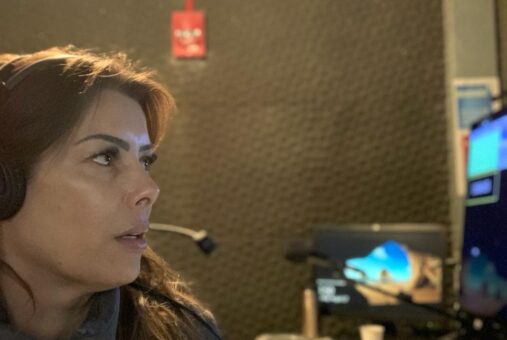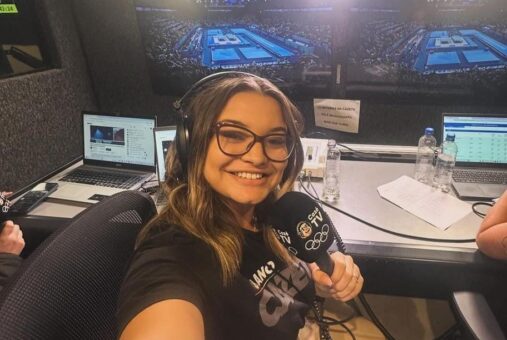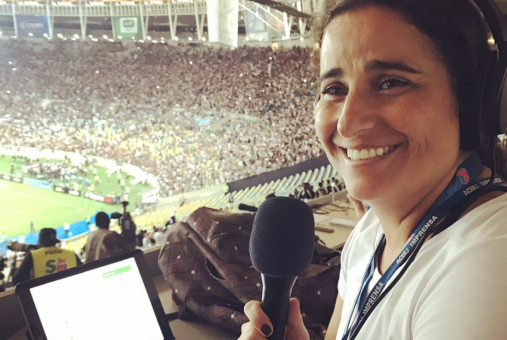On June 19, a user on X criticized the supposed work of Renata Silveira, a TV Globo announcer in Brazil.
"I don't know what was worse today, Corinthians' performance or Renata Silveira's commentary on Premiere. Terrible."
Silveira quickly responded, "It must have been the team because I didn't commentate that game. Forget about me," she said.
The user deleted his post, but not before it went viral, exemplifying the sexism against Brazilian women sports announcers. Two days later, Silveira decided to stop posting on her X account without explanation.
Her case is far from isolated. On social media, alongside numerous compliments, negative and often defamatory messages spread against the presence of women sports announcers on Brazilian television.
The hate emerges as these announcers gain more visibility and amid political polarization in society. Women only became sports announcers more recently, gaining momentum since the late 2010s, driven by the Fourth Wave of Feminism.
Since then, they conquered the space and now work on all major Brazilian networks, sometimes covering the most important matches of Brazilian and global soccer. However, their success came quite late and they had to overcome many obstacles – including sexism – to get there.
In the 1970s, pioneers like Zuleide Ranieri and Claudete Troi broadcasted soccer games on Brazilian radio. Yet, it wasn’t until 1997 that the first woman to announce appeared on television.
In September of that year, Luciana Mariano announced a match of the Torneio Primavera, a championship for women's teams from Rio de Janeiro and São Paulo.

Luciana Mariano, who announces soccer at ESPN Brasil and is a pioneer among women announcing soccer in Brazil, having done the first broadcast in 1997 (Photo: Courtesy)
She recalls that at the time, information about women's soccer was scarce.
"I didn't know their names because there was no information in the newspapers, nowhere. Carla França, who was a reporter at the time, and I went to the locker room door: 'Please, give us the names.' It was surreal," Mariano told LatAm Journalism Review (LJR).
The journalist ended up there somewhat by chance. At 21, she was working as a reporter for Rádio Gazeta. Bandeirantes TV decided to hold a contest called "Golaço" to find the first woman to announce soccer – this type of contest would be held by other broadcasters in the following decades, and is unusual when hiring male announcers.
"Mauro Beting, who worked with me at the radio, called me: 'There's going to be a contest, do you want to participate? You know a lot about soccer.' But I had never considered it. I had never seen a woman announce, so it didn't seem possible to me," she said.
A prize substantial enough to cover her car debt convinced her to give it a try. The tests involved announcing game moments on the Sunday program "Apito Final." Mariano steadily won over both the public and the jury, ultimately securing victory.
A week later, she received an official invitation.
"Band called and said: 'We want to hire you, and there's already a game for you to announce.' I panicked because announcing a game snippet is one thing; doing a live national broadcast for the whole of Brazil is another. But I didn't back down; I said: 'Okay, let's go,'" Mariano said.
Mariano continued announcing women's soccer games. Eventually, she began dating her colleague Luciano do Valle, who dreamed of broadcasting the Pernambuco State Championship for men's soccer. They got married, moved to Pernambuco, and announced the 1999 championship together.
It was the first time a woman announced a men's soccer game in Brazil.
"The audience response was incredible; the entire state got involved. I was even honored with the title of citizen of Pernambuco for my work," she said.
However, another network acquired the rights to broadcast the final game and made her an indecent proposal.
"They said, 'On our team, women don't announce. You can come as a reporter,'" she said. "I asked Luciano, 'Have you ever seen an announcer become a reporter again?' He said, 'No, never.' I replied, 'Then I won't accept either.'”
A 19-year hiatus from announcing began for Mariano, during which she worked as a TV presenter and director.
On March 6, 2018, two days before International Women's Day, she received a phone call from Dudu Magnani, a former colleague from 1997, now with ESPN Brazil, offering her a job announcing a match.
The March 8 game between Zenit and RB Leipzig, for a spot in the Europa League quarter-finals, marked her return.
"People started saying: 'Wait, there's a woman announcing on ESPN.' But they didn't know my history, they knew nothing. They were just like, 'Wow, a woman announces!' It was a lot of compliments and positive feedback," she said.
The positive reception led ESPN to hire her to continue announcing, which she still does. Since then, she has covered Premier League, La Liga, and Europa League men's games, as well as the Women's Euro final. Besides soccer, Mariano was also the first woman to announce basketball on Brazilian TV.
"There have been many firsts," she said.
The presence of women announcers on Brazilian TV was finally consolidated in 2018. Mariano joined ESPN, Esporte Interativo selected Vivi Falconi through the "A Narradora Lay’s" contest, and Fox Sports chose three women – Isabelly Morais, Manuela Avena, and Renata Silveira – through a contest to announce the men's World Cup on a secondary channel. Globo, the largest media conglomerate in the country, made its debut with women announcers in 2021.

Letícia Macedo, 20 years old, who is an announcer at the online channel Cazé TV (Photo: Courtesy)
Today, almost all major TV channels have women among their announcers. This includes Cazé TV, an online channel created by streamer Cazé, which has acquired broadcasting rights for some of the world's major sports events.
Letícia Macedo, Cazé TV's announcer, dreamed of being a professional player as a child, "but lacked talent with the ball." At 15, she moved from the countryside to São Paulo and studied sports organization.
"I started working at an online radio station and, during a match, was asked to announce a penalty. From there, I discovered my talent for announcing. At 16, I announced my first final and never stopped," Macedo, now 20, told LJR.
She has been at Cazé TV for about a year, debuting in the Women's Champions League final and participating in other significant broadcasts like the Paris Olympics and the 2023 Women's World Cup.
Yet, alongside stories of meteoric rises, others still strive for more space in the profession. Luciana Zogaib worked for 24 years in a pharmaceutical multinational while keeping her dream of working in sports as a hobby.
Like Mariano, Zogaib didn't consider announcing due to a lack of role models.
"I always wanted to work in sports journalism, especially soccer, but didn't think about it because I didn't have any references. It came about gradually," she told LJR.
She started in sports journalism with a blog and, in 2016, co-founded the website Damas do Esporte, focused on undercovered sports. The following year, she was invited to comment on a soccer game on internet radio. The radio owner saw potential in her voice and encouraged her to become an announcer, initially without pay.
In 2018, she participated in the Fox Sports contest and became a finalist. By 2021, she had joined Rádio Roquette Pinto, where she contributed as a reporter and commentator. She eventually joined the teams at TV Brasil and Rádio Nacional, both public broadcasters, announcing games and expanding her role.

Luciana Zogaib, who announces sports on the public broadcaster TV Brasil (Photo: Courtesy)
She doesn't hide that she would like to be on a bigger TV network but believes her extensive experience makes her a more well-rounded professional.
"Of course, I'd love to be at Globo, covering the Olympics and feeling accomplished. But on the other hand, I believe my current path is giving me valuable experience. If I get there someday, it’ll happen in a different way," she said.
All the announcers interviewed said they notice a difference in treatment between men and women in sports announcing. What bothers them most are the attacks on social media.
"Just yesterday, I posted a video, and while some people praised it, many others said my work was terrible, that women aren't fit for this, that I should be washing dishes," Zogaib said.
She reports that people attack her posts on Instagram and Twitter. Although she blocked comments on her posts, she left her Instagram messages open and continues to receive direct attacks. This led her to seek professional psychological support to cope with the emotional impact.
Mariano took a different approach: she formed a legal team and filed over 260 lawsuits against online defamers.
"It's no use complaining about those who attack me. I won't allow anyone to invade my virtual space because my social network is an extension of my home. I won't accept being offended or harassed. I won't tolerate any crimes on my network," she said.
According to Mariano, some cases have been judged, and the attackers found guilty. Sentences required most of the attackers to perform community service, usually related to gender violence, she said. It’s a punishment she finds "quite fitting."
Mariano attributes the attacks to the political polarization in Brazil since 2018, with the rise of Bolsonarism and the radical right. She recalls that the reception used to be overwhelmingly positive months before the elections in October.
"After that period, it became something like 'those who like it are woke; those who don't are right-wing.' It turned into something unrelated to us," she said.
LJR tried to contact Renata Silveira and other Globo professionals, but the network cited scheduling issues and didn't grant interviews. Via email, Globo's press office said the number of women, including announcers and commentators, on their broadcast teams increased from 3% in 2019 to 35% in 2024 (as of May).
"An increase of over 1000%. In response to criticism, we continue to invest in diversity, hiring professionals from various regions of the country with diverse accents and experiences to enrich our sports broadcasts," the network stated.
Mariano, meanwhile, offers advice for professionals and aspiring announcers under attack. In addition to pursuing legal action, she has deeply studied the issue of sexism from the perspectives of psychology, sociology, and philosophy. Today, she is confident that the problem is not with her.
"It's not Luciana who has a problem; it's society that has a problem with women occupying a space that has always been believed to be for men. It's as simple as that," she said.